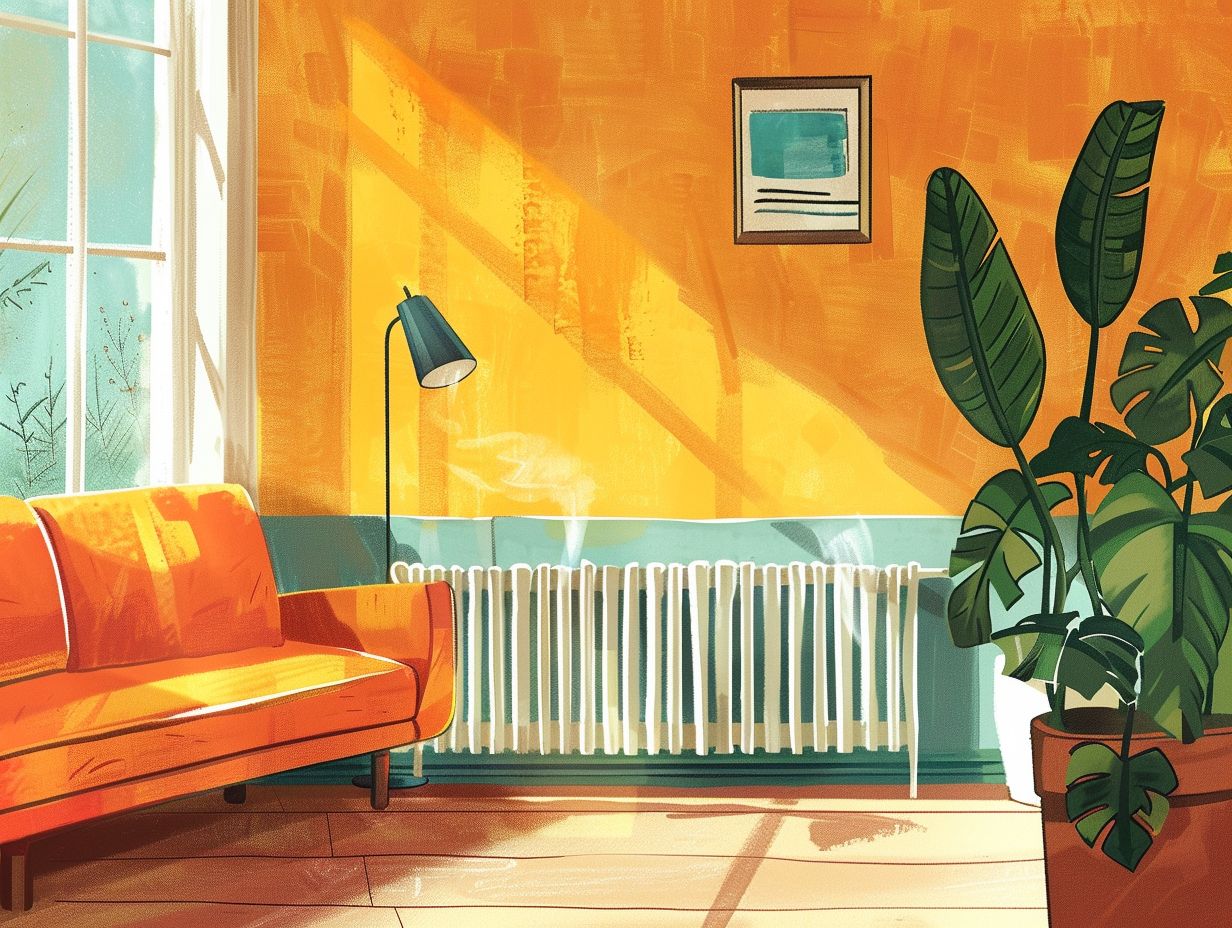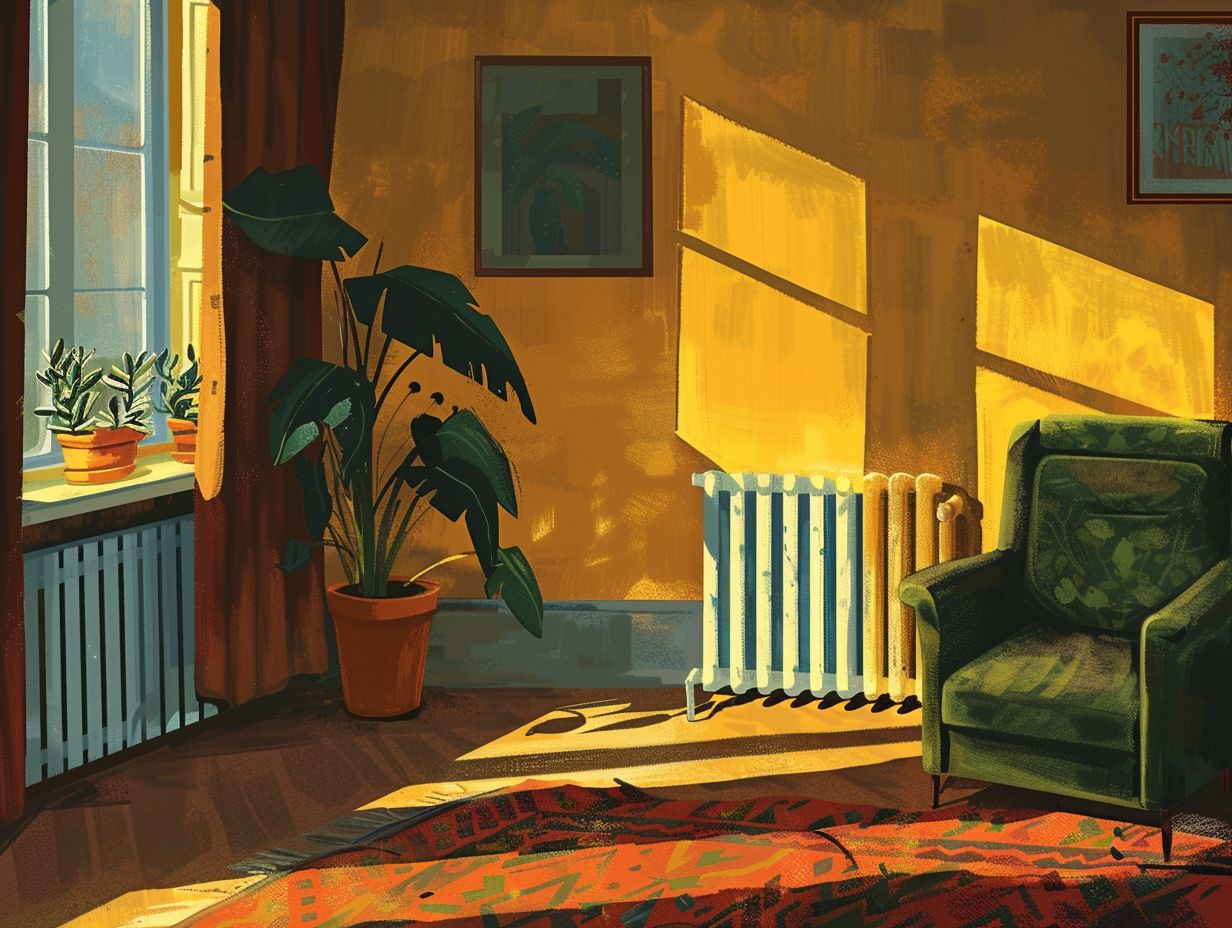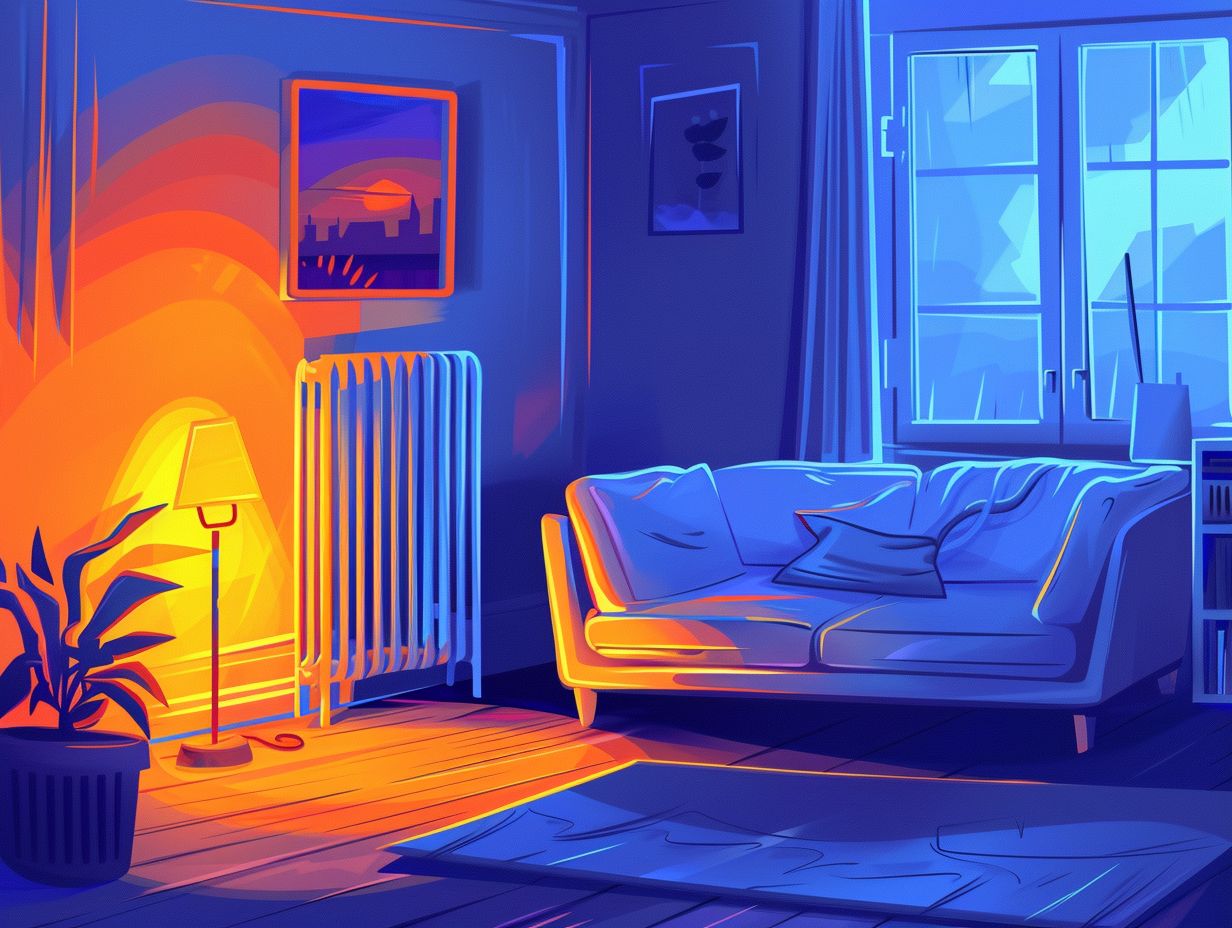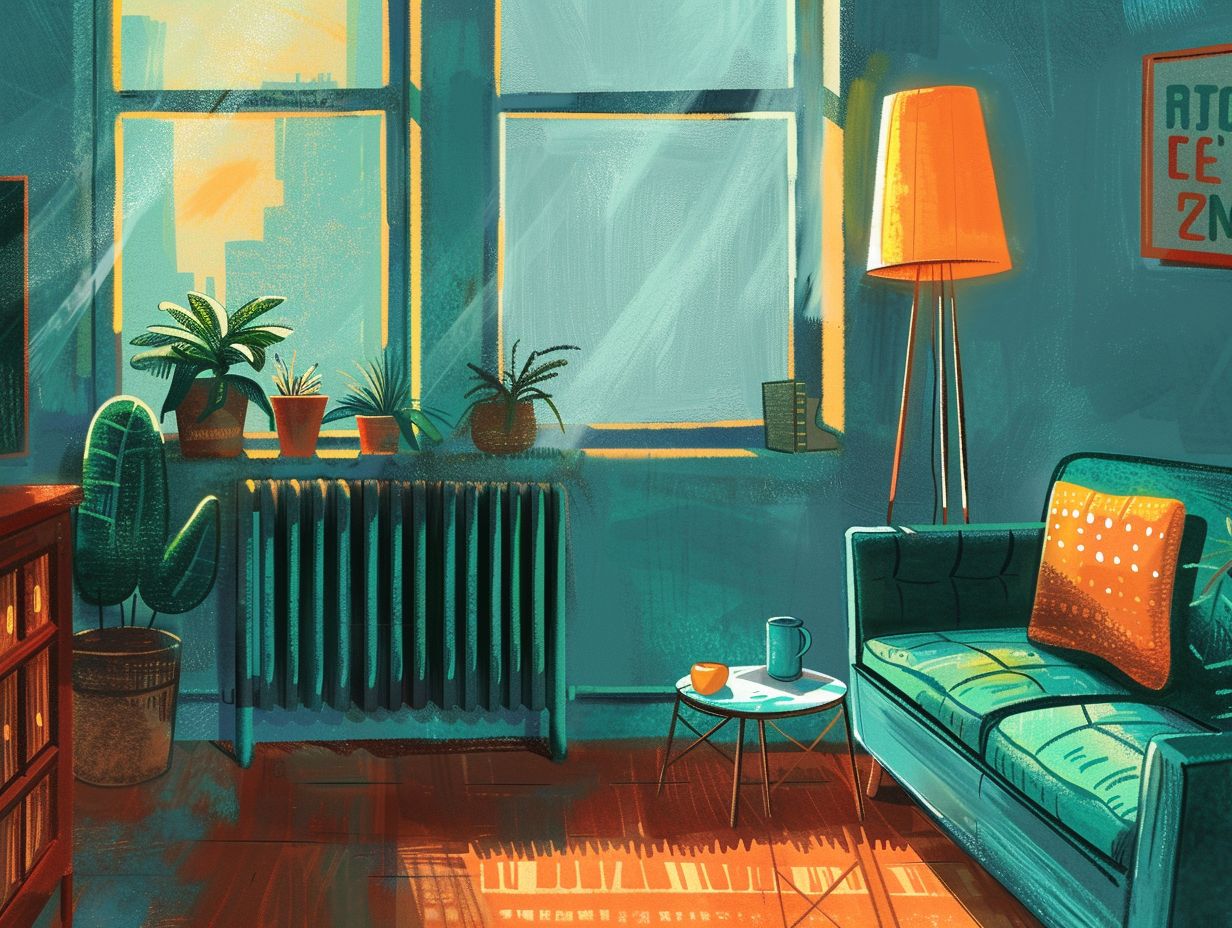Have you ever questioned why your living room radiator continues to emit heat even after the heating system has been turned off? Enhancing your knowledge of the functioning of radiator heating systems and the potential reasons for a radiator remaining hot can empower you to tackle and mitigate this problem effectively.
Various factors, ranging from thermostat malfunctions to pipe leakages and air entrapment within the system, could be contributing to the overheating of your radiator.
This article delves into the intricacies of radiator heating systems and furnishes you with actionable measures to ensure your home remains both comfortable and energy-efficient.
Key Takeaways:

- Even when heating is off, a radiator may still be hot due to potential issues such as a malfunctioning thermostat, leaking pipes, or trapped air in the system.
- To address a hot radiator when heating is off, steps such as adjusting the thermostat, bleeding the radiator, or checking for leaks may be necessary.
- Preventing a hot radiator when heating is off can be achieved through regular maintenance and upgrades to more efficient systems, such as smart thermostats or energy-efficient radiators.
Understanding Radiator Heating Systems
Understanding Radiator Heating Systems involves understanding the intricate network of radiators, central heating systems, and valves that work together to provide warmth and hot water throughout a space.
These systems are crucial for maintaining a comfortable indoor environment, especially during colder seasons.
You must recognise the importance of radiators in this heating system, as they efficiently transfer heat into rooms by radiating warmth. Central heating systems play a pivotal role in generating the hot water that is circulated through the radiators, ensuring consistent heating.
Valves placed on radiators enable precise control over temperature adjustments, allowing occupants to tailor the warmth levels as needed. The circulation of hot water within the system is what facilitates the distribution of heat to all corners of the room, creating a cosy atmosphere that promotes a sense of well-being.
How Radiator Heating Works
Radiator heating operates by circulating hot water through a network of pipes to heat up radiators in various rooms. The heat generated from the hot water is then transferred to the rooms through the radiators, controlled by a thermostat that regulates the temperature in each space.
This heating system works efficiently by ensuring that the hot water flows through the pipes at a consistent rate, providing continuous warmth to the rooms. As the hot water circulates through the system, it releases heat energy that warms the air around it.
The pipes play a crucial role in distributing this heat evenly throughout the space, ensuring uniform heating in different areas of the building.
The thermostat acts as the brain of the system, monitoring the room temperature and adjusting the flow of hot water to maintain a comfortable and cosy environment. Radiator heating systems are known for their reliability and effectiveness in keeping homes warm during cold weather.
Possible Causes of a Hot Radiator
When facing a hot radiator issue, you may find it perplexing and in need of professional expertise, typically from a heating engineer. The problem could stem from various causes, such as malfunctioning thermostats, leaking pipes, or trapped air within the heating system.
If the thermostat is not operating correctly, it might instruct the boiler to continue heating the water, thereby keeping the radiator hot.
Leaking pipes can cause water to escape the system, leading to the circulation of hot water unnecessarily. Trapped air within the system can create blockages, impeding proper circulation and resulting in certain radiators remaining hot.
Seeking the assistance of a heating engineer is essential in accurately diagnosing the issue and implementing the necessary repairs to restore your heating system to optimal functionality.
Thermostat Malfunction

One common reason for a radiator running hot even when the heating is off is a malfunctioning thermostat. This can cause the temperature regulation to be inaccurate, resulting in overheating in specific areas of your space. Not only can this issue lead to discomfort, but it can also drive up heating costs.
A malfunctioning thermostat can further impact the overall energy efficiency of your heating system. Inefficient temperature control may result in unnecessary energy wastage and put undue strain on your HVAC system.
The inconsistent room temperatures arising from a faulty thermostat can create discomfort and potentially even health concerns for individuals in the environment.
To address these issues effectively, it is crucial to review the thermostat settings, replace batteries if required, and consider recalibrating or replacing the thermostat if the problem persists.
Leaking Pipes
Leaking pipes within your heating system can cause hot radiators even when the heating is turned off. This occurs when hot water leaks or flows excessively, leading to overheating. It is essential to identify and repair these leaks promptly to maintain the efficiency of your heating system.
Plus causing hot radiators, leaky pipes in the heating system can disrupt its overall functionality, resulting in energy wastage and potential heating issues.
When pipes leak, the system may struggle to maintain a consistent temperature throughout the property, resulting in discomfort and increased energy consumption.
Early detection of these leaks through signs such as water stains, damp spots, or unusual sounds is crucial in preventing further damage and ensuring the effective operation of the system.
Promptly addressing leaks by repairing or replacing the affected pipes is vital to prevent the escalation of heating problems.
Air Trapped in the System
Air trapped in your heating system can lead to inefficiencies, causing certain radiators to remain hot even when the heating is turned off. Properly bleeding the radiators and balancing the system can help address this issue and restore optimal heating performance.
This problem of air pockets in the system can result in temperature inconsistencies across different rooms, with some areas being excessively warm while others do not receive sufficient heating. When radiators are not adequately bled, they can become less effective, impacting the overall comfort of your home.
To resolve this issue, begin by turning off your heating system and allowing it to cool down. Identify the bleed valve on each radiator and use a radiator key to open it slightly, releasing the trapped air until you hear a hissing sound or water starts dripping.
Remember to check your boiler pressure afterward and top it up if necessary to achieve a balanced system.
Addressing a Hot Radiator When Heating is Off
When dealing with a hot radiator whilst the heating is turned off, you should seek the assistance of a heating expert who can diagnose the underlying problem and carry out the necessary repairs or adjustments. Taking immediate action is crucial to prevent further heating complications and maintain a comfortable indoor environment.
If you observe a radiator emitting heat when the heating system should be inactive, it is important to first verify the thermostat settings to ensure they are configured correctly. In some cases, a simple adjustment of the thermostat may resolve the issue.
If the problem persists, it is advisable to promptly reach out to a heating professional. They possess the knowledge and skills to conduct a thorough assessment of the radiator and heating system, identifying any defects or malfunctions that could be causing the radiator to remain hot.
Regular maintenance and inspections by a qualified technician can help prevent such issues from occurring in the future.
Steps to Take

When faced with a hot radiator when the heating is off, your initial step should be to contact a heating expert to assess the situation and determine the underlying cause. They can then recommend appropriate solutions to resolve the issue and restore proper heating functionality.
An experienced heating professional will likely start by checking the radiator valves to ensure they are fully open and not causing blockages. Following this, they may inspect the thermostat settings to see if there are any issues with the temperature control.
The expert may need to verify the boiler pressure and bleed the radiators if air has become trapped within the system. By engaging a qualified heating specialist, homeowners can avoid potential hazards and ensure their heating system operates efficiently.
Preventing a Hot Radiator When Heating is Off
To prevent a hot radiator when the heating is off, you should take proactive measures by ensuring proper system maintenance and implementing effective strategies to balance heat distribution. Addressing potential issues before they escalate is crucial for maintaining consistent and comfortable heating throughout your space.
Regular system checks are essential for identifying any leaks, blockages, or air pockets that may be causing uneven heating. It is important to ensure that all valves and vents are functioning correctly to optimise the efficiency of your heating system.
Balancing heat distribution by adjusting individual radiator valves can help prevent overheating in certain areas while ensuring adequate warmth in others.
Proper insulation around pipes and radiators is also important for maintaining a balanced temperature throughout your home. By taking these proactive steps, you can enhance heating efficiency, prolong the lifespan of your heating system, and reduce the risk of costly repairs in the future.
Maintenance Tips
Regular maintenance of your heating system is crucial to avoid issues such as overheating radiators when the heating is turned off. Tasks like bleeding radiators, checking valves, and inspecting the boiler are essential in ensuring that your system operates efficiently and effectively.
Proper maintenance also includes cleaning or replacing air filters on a regular basis to enhance air quality and maintain proper airflow.
It is imperative to keep the area surrounding the radiator clear to facilitate even distribution of heat. Regularly checking for any leaks in the system and promptly addressing them can prevent potential damage and costly repairs in the future.
By following these simple steps, homeowners can extend the lifespan of their heating systems and experience consistent warmth during the colder months.
Upgrading to a More Efficient System
If you are experiencing persistently hot radiators when the heating is turned off, it may be worth considering an upgrade to a more efficient heating system. Modern systems utilise advanced technology to distribute heat more evenly throughout the space, creating a comfortable living environment.
By upgrading, homeowners can benefit from programmable thermostats that allow for precise temperature adjustments based on specific needs, leading to optimised comfort and reduced energy consumption.
Newer systems often include smart features that enable remote monitoring and control, offering convenience and peace of mind.
Investing in a modern heating system not only enhances comfort but also contributes to a more sustainable and cost-effective living space.
Frequently Asked Questions

Why Is My Living Room Radiator Hot When Heating Is Off?
This is a common problem that many homeowners face. There could be a few reasons why your living room radiator is hot even when the heating is turned off.
Is My Radiator Broken?
Not necessarily. There could be a few different explanations for why your living room radiator is hot when the heating is off. It’s best to troubleshoot and find the root cause before assuming your radiator is broken.
Could It Be Due to a Faulty Thermostat?
It’s possible that a faulty thermostat could be the reason why your living room radiator is hot when the heating is turned off. If your thermostat is not working properly, it may be sending the wrong signals to your heating system.
Can Air Trapped in the System Cause a Hot Radiator When Heating is Off?
Yes, air trapped in the heating system can cause your living room radiator to remain hot even when the heating is turned off. This can be easily fixed by bleeding your radiators to release any trapped air.
What If the Radiator Valves Are Stuck?
If the radiator valves are stuck in the open position, it could be causing your living room radiator to remain hot when the heating is off. Try turning the valve to the closed position and see if the radiator cools down.
Should I Call a Professional to Fix This Issue?
If you are unsure of the cause of your living room radiator being hot when the heating is turned off, it’s best to call a professional. They will be able to diagnose the problem and provide the necessary repairs to ensure your heating system is functioning properly.

